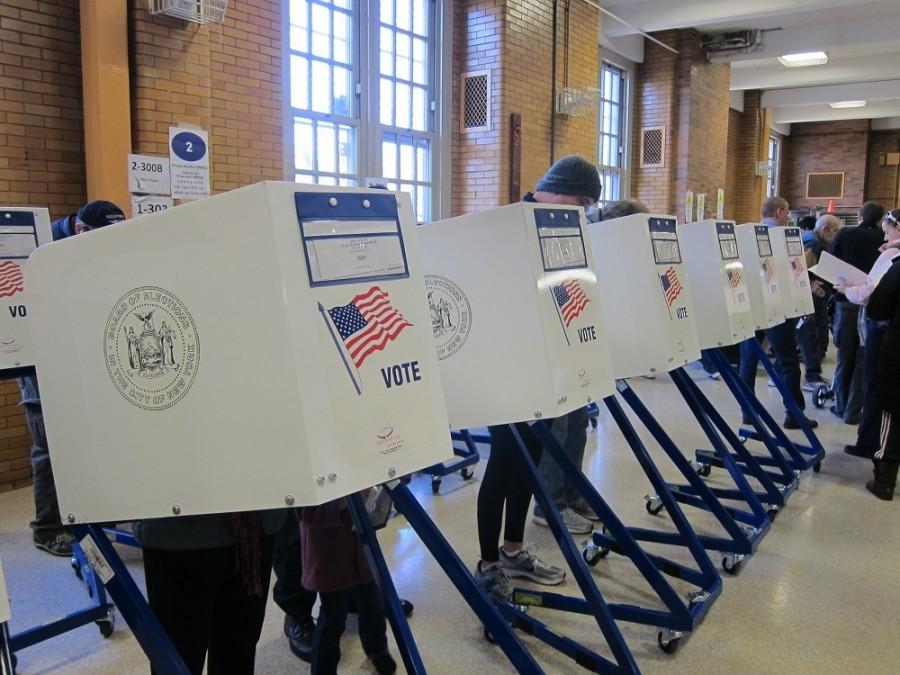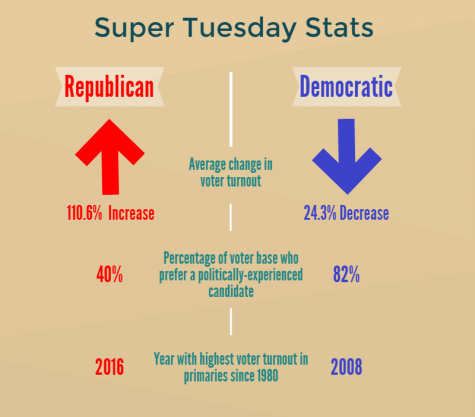Media Matters: 2016 campaign coverage demonstrates the importance of media in politics
Joe Shlabotnik, Flickr
In the picture above, U.S. citizens vote at the polls during the 2012 Presidential election. Although critics claim that the media has not done enough to educate voters throughout the 2016 campaigning period, rising voter participation indicates that the mainstream media’s coverage could have positive repercussions to democracy.
March 12, 2016
The road to the 2016 Presidential election has been marked by unprecedented levels of shocking rhetoric, unexpected candidates and radical policies. A year ago I would have laughed if I saw a news headline on the Mexican president likening a presidential candidate to Hitler on a news site other than the Onion, but now, this kind of article resembles a fish in a stream of similar comical stories reminiscent of tabloid gossip.
Many people complain about the candidates’ remarks in the 2016 presidential elections. However, personal jabs and scandal has always been a part of the electoral process, but with more flavorful personalities in the race and more controversy, any news focused on the candidates’ agendas has gotten buried under information deemed “non-educational.”
As a result of this rising non-educational content, viewers and news consumers frequently lament the decline of the quality of today’s media.
And yet, while not the exemplary model for political media, the news coverage of the election has been beneficial for the political process by increasing voter turnout and political participation.
For example, the flashy debates between the 2016 Republican candidates have generated to a massive increase in Republican voter participation with voter turnout increases greater than 37% in all Super Tuesday states. The same cannot be said about the less outrageous Democratic debates. In fact, the Democrats saw disappointing levels of voter participation in the primaries with nine out of the eleven Super Tuesday states experiencing voter turnout losses greater than 10%.
Much of the differences between past primaries and the current Republican primary may be attributed to media coverage. The 2016 Republican candidates have had much more “non-educational” news coverage, or coverage focused on repeated phrases, visceral reactions or name-calling rather than on substantive policy.
Clearly, viewers seem more intrigued by the unusually entertaining debates than by the typical substantive arguments which arise every four years.
Admittedly, a nation in which everyone paid attention to in-depth political news coverage would be optimal, but we cannot expect audiences to pay attention to strictly politically-meaningful content for long. Thus, the trivial political media we see every day is a necessary evil in a democracy with abnormally low voter turnout. Without external stimulus, media coverage and outre claims drive political action. And higher voter turnout is necessary for any democratic state to function properly.
For this reason, the media cannot be blamed for increasing the number of uninformed voters. Only by going through the political process can uninformed voters develop educated political opinions. Although a disproportionate amount of focus has been given to the coverage of non-educational content, many media sources still cover critical political issues. Thus, the catchy tabloid gossip has the potential to coax previously-uninterested citizens into learning more about the politics.
Throughout history, media sources have dictated how individuals view politics. That the media chooses to encourage political participation is a step towards the goal of having an informed politically-active population.


















![“[Building nerf blasters] became this outlet of creativity for me that hasn't been matched by anything else. The process [of] making a build complete to your desire is such a painstakingly difficult process, but I've had to learn from [the skills needed from] soldering to proper painting. There's so many different options for everything, if you think about it, it exists. The best part is [that] if it doesn't exist, you can build it yourself," Ishaan Parate said.](https://harkeraquila.com/wp-content/uploads/2022/08/DSC_8149-900x604.jpg)




![“When I came into high school, I was ready to be a follower. But DECA was a game changer for me. It helped me overcome my fear of public speaking, and it's played such a major role in who I've become today. To be able to successfully lead a chapter of 150 students, an officer team and be one of the upperclassmen I once really admired is something I'm [really] proud of,” Anvitha Tummala ('21) said.](https://harkeraquila.com/wp-content/uploads/2021/07/Screen-Shot-2021-07-25-at-9.50.05-AM-900x594.png)







![“I think getting up in the morning and having a sense of purpose [is exciting]. I think without a certain amount of drive, life is kind of obsolete and mundane, and I think having that every single day is what makes each day unique and kind of makes life exciting,” Neymika Jain (12) said.](https://harkeraquila.com/wp-content/uploads/2017/06/Screen-Shot-2017-06-03-at-4.54.16-PM.png)








![“My slogan is ‘slow feet, don’t eat, and I’m hungry.’ You need to run fast to get where you are–you aren't going to get those championships if you aren't fast,” Angel Cervantes (12) said. “I want to do well in school on my tests and in track and win championships for my team. I live by that, [and] I can do that anywhere: in the classroom or on the field.”](https://harkeraquila.com/wp-content/uploads/2018/06/DSC5146-900x601.jpg)
![“[Volleyball has] taught me how to fall correctly, and another thing it taught is that you don’t have to be the best at something to be good at it. If you just hit the ball in a smart way, then it still scores points and you’re good at it. You could be a background player and still make a much bigger impact on the team than you would think,” Anya Gert (’20) said.](https://harkeraquila.com/wp-content/uploads/2020/06/AnnaGert_JinTuan_HoHPhotoEdited-600x900.jpeg)

![“I'm not nearly there yet, but [my confidence has] definitely been getting better since I was pretty shy and timid coming into Harker my freshman year. I know that there's a lot of people that are really confident in what they do, and I really admire them. Everyone's so driven and that has really pushed me to kind of try to find my own place in high school and be more confident,” Alyssa Huang (’20) said.](https://harkeraquila.com/wp-content/uploads/2020/06/AlyssaHuang_EmilyChen_HoHPhoto-900x749.jpeg)










